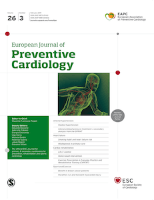
European Journal of Preventive Cardiology
Scope & Guideline
Elevating knowledge in cardiovascular disease prevention.
Introduction
Aims and Scopes
- Cardiovascular Risk Assessment and Prediction:
The journal emphasizes the development and validation of cardiovascular risk prediction models, addressing the challenges in predicting outcomes across diverse populations. - Lifestyle and Behavioral Interventions:
A significant focus is placed on lifestyle modifications, including exercise, dietary changes, and psychosocial factors, which are crucial for the prevention and management of cardiovascular diseases. - Pharmacological Interventions:
Research on the efficacy and safety of various pharmacological treatments, particularly lipid-lowering therapies and antihypertensives, is a central theme. - Epidemiology and Public Health:
The journal publishes studies that explore the epidemiology of cardiovascular diseases, highlighting trends, risk factors, and the impact of social determinants on cardiovascular health. - Innovative Therapeutic Approaches:
There is a keen interest in exploring novel therapeutic strategies, including the use of emerging drugs and technologies in the prevention and treatment of cardiovascular diseases. - Interdisciplinary Approaches:
The journal promotes interdisciplinary research involving cardiology, endocrinology, nephrology, and other fields to address the multifactorial nature of cardiovascular diseases.
Trending and Emerging
- Holistic and Multidisciplinary Approaches:
Research is increasingly focusing on holistic strategies that incorporate physical, mental, and social health perspectives in cardiovascular prevention and rehabilitation. - Digital Health and Telemedicine:
There is a growing interest in the application of digital health technologies and telemedicine in cardiovascular care, especially in the context of the COVID-19 pandemic. - Personalized Medicine:
Emerging themes include the personalization of cardiovascular prevention strategies based on genetic, metabolic, and lifestyle factors, aiming to tailor interventions to individual patient needs. - Environmental and Socioeconomic Impacts:
Studies exploring the impact of environmental factors, such as air pollution and socioeconomic status, on cardiovascular health are gaining prominence. - Women’s Cardiovascular Health:
There is an increasing focus on women's cardiovascular health, addressing specific risk factors, outcomes, and preventive strategies tailored for women. - Integration of AI and Machine Learning:
Research exploring the use of artificial intelligence and machine learning in predicting cardiovascular risk and outcomes is emerging as a significant trend.
Declining or Waning
- Traditional Risk Factors:
Research centered around traditional cardiovascular risk factors such as cholesterol levels and hypertension management is becoming less prevalent, as newer studies focus on integrated and holistic approaches. - Single-Disease Studies:
There is a noticeable decline in studies that examine cardiovascular diseases in isolation, with a shift towards understanding comorbidities and the interplay between multiple health conditions. - Basic Science Research:
The journal's focus on basic science research related to cardiovascular biology has decreased, as there is a greater emphasis on clinical and translational research that addresses real-world applications. - Acute Cardiovascular Events:
The emphasis on acute cardiovascular events, such as myocardial infarction, is diminishing, with more attention being directed towards preventive strategies and long-term management.
Similar Journals
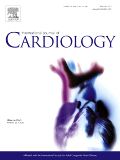
International Journal of Cardiology
Connecting Researchers and Clinicians to Shape Heart HealthThe International Journal of Cardiology is a premier publication in the field of Cardiology and Cardiovascular Medicine, published by Elsevier Ireland Ltd. With an impressive impact factor and ranked in the top quartile (Q1) of its category, this journal serves as a vital resource for researchers, clinicians, and scholars committed to advancing cardiovascular health. Founded in 1981, the journal has been pivotal in disseminating significant findings, with a wide-ranging scope that includes original research, reviews, and clinical studies aimed at improving patient outcomes and understanding heart diseases. Its robust ranking of #73 out of 387 in Scopus ensures that it remains a leading platform for impactful cardiovascular research. While currently not an open-access publication, the journal's commitment to quality and relevance makes it an essential reference point within an ever-evolving medical landscape. For those engaged in cardiovascular research, the International Journal of Cardiology is not just a journal; it's an indispensable source of knowledge shaping the future of heart health.

Journal of the American Heart Association
Transforming Cardiovascular Medicine with Open Access InsightsThe Journal of the American Heart Association, published by WILEY, serves as a premier platform for advancing cardiovascular medicine through its commitment to open access, fostering global dissemination of cutting-edge research since 2012. It proudly holds a prestigious position within the top quartile (Q1) in the categories of Cardiology and Cardiovascular Medicine, as evidenced by its Scopus ranking of #49 out of 387 journals, placing it in the 87th percentile. With a focus on innovative studies and transformative findings, this journal is essential for cardiologists, researchers, and healthcare professionals seeking to stay at the forefront of cardiovascular knowledge. The journal aims to bridge the gap between basic science and clinical practice, presenting findings that shape the future of heart health treatment and prevention. As a resource for academic and clinical communities alike, the Journal of the American Heart Association is dedicated to enhancing the understanding and treatment of cardiovascular diseases globally.
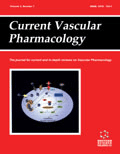
Current Vascular Pharmacology
Shaping the Future of Cardiovascular Pharmacological ResearchCurrent Vascular Pharmacology is a premier academic journal published by Bentham Science Publications Ltd, focusing on the intersection of pharmacology and cardiovascular medicine. With an impact factor that reflects its significance in the field, this journal ranks in the Q1 category for both Pharmacology and Cardiology, showcasing its dedication to high-quality research. Its Scopus ranks place it in the top percentile of its categories, highlighting its influence among scholars and practitioners alike. Issued since 2003 and continuing through 2024, Current Vascular Pharmacology aims to disseminate cutting-edge findings and foster knowledge exchange among researchers, professionals, and students engaged in cardiovascular pharmacology. Despite being a subscription-based journal, it remains a vital resource for those seeking the latest advancements in drug development and therapeutic interventions for vascular diseases. Located in the United Arab Emirates, the journal serves as an essential platform for global discourse on vascular health.
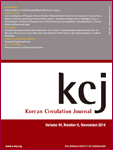
Korean Circulation Journal
Pioneering Insights in Cardiology and Cardiovascular Medicine.Korean Circulation Journal, published by the Korean Society of Cardiology, has established itself as a prominent platform for disseminating research in the fields of Cardiology and Cardiovascular Medicine. With an ISSN of 1738-5520 and an E-ISSN of 1738-5555, this journal has been at the forefront of cardiovascular science since its inception in 2006 and is projected to continue until 2024. The journal's commitment to quality is reflected in its 2023 category quartiles, ranking in the second quartile (Q2) for both Cardiology and Internal Medicine, as well as its commendable Scopus rankings within the respective fields. Located in South Korea, the journal aims to bridge the gap between cutting-edge research and practical applications, serving as an invaluable resource for researchers, healthcare professionals, and students keen on advancing their understanding of cardiovascular health. Although currently not an open-access journal, it provides a wealth of knowledge that encourages evidence-based practice in clinical settings.

Acta Cardiologica Sinica
Empowering the Global Cardiovascular Community.Acta Cardiologica Sinica is a distinguished journal dedicated to the advancement of cardiology and cardiovascular medicine, published by the Taiwan Society of Cardiology. Since its inception in 1988, this journal has provided a platform for researchers and clinicians to share cutting-edge findings and insights into cardiac health, cardiovascular diseases, and innovative treatment strategies. With an impressive Q3 classification in the Cardiology category for 2023, the journal is recognized for its contributions to the field, ranked #208 out of 387 in Scopus, placing it within the 46th percentile of medical journals. Although it currently does not offer open access options, it remains a valued resource for the global cardiovascular community. The journal's commitment to disseminating high-quality research papers, reviews, and case studies ensures that it plays a vital role in improving cardiovascular health practices and outcomes. For researchers, professionals, and students alike, Acta Cardiologica Sinica is essential reading for staying informed about the latest developments in cardiology.

Pakistan Heart Journal
Innovating Heart Health Research for a Brighter Tomorrow.Pakistan Heart Journal, with the ISSN 0048-2706 and E-ISSN 2227-9199, is a premier publication by the Pakistan Cardiac Society, dedicated to advancing the field of cardiology and cardiovascular medicine. Established as an Open Access journal since 2011, it provides a valuable platform for researchers and clinicians to disseminate innovative findings and insights within this critical area of health. Based in Karachi, Pakistan, at the National Institute of Cardiovascular Diseases, this journal aims to foster an enriched understanding of cardiovascular health by publishing rigorous research, case studies, and review articles. Despite its current categorization as Q4 in the latest 2023 quartiles and a rank of 357/387 in the Scopus database, it plays a vital role in the academic community, encouraging collaborative efforts and dialogue among professionals. The journal aspires to converge diverse perspectives and innovations in cardiology from 2019 to 2024, thereby enhancing the quality and scope of cardiovascular research in the region and beyond.

Nepalese Heart Journal
Advancing Cardiovascular Knowledge in NepalNepalese Heart Journal, published by the CARDIAC SOC NEPAL, serves as a premier platform for disseminating knowledge in the field of cardiology and cardiovascular health. With an ISSN of 2091-2978, this journal aims to bridge the gap between researchers, clinicians, and academicians by presenting high-quality, peer-reviewed articles that address clinical practices, innovative research, and emerging trends in heart disease management, especially within the context of Nepal and the surrounding region. Although it operates under a traditional publishing model, its commitment to excellence aids in reinforcing the scientific discourse in an area critical to public health. The journal is a valuable resource for professionals and students alike who are focused on advancing their understanding of cardiology and its implications for health policy and practice. Exploring the intersections of local challenges and global advancements in heart health, the Nepalese Heart Journal is poised to contribute meaningfully to the evolving landscape of cardiovascular research.
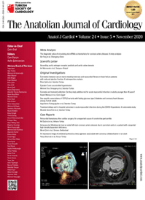
Anatolian Journal of Cardiology
Transforming Cardiology with Rigorous Research and Peer Review.The Anatolian Journal of Cardiology, published by KARE PUBL, stands as a vital resource in the field of Cardiology and Cardiovascular Medicine. With an ISSN of 2149-2263 and E-ISSN 2149-2271, this Open Access journal has been fostering the dissemination of critical research since 2001, ensuring that high-quality content is freely available to a global audience. Based in Turkey, the journal aims to bridge gaps in cardiological knowledge through rigorous peer-reviewed articles that span a wide range of topics, from innovative clinical practices to groundbreaking research findings. While its current ranking places it in the Q3 category of cardiology journals, the Anatolian Journal of Cardiology continues to strive towards enhancing its impact, currently holding a Scopus rank of 236 out of 387. Researchers, practitioners, and students alike will find this journal an essential platform for keeping abreast of the latest developments in cardiovascular health.
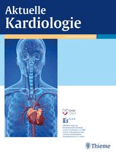
Aktuelle Kardiologie
Elevating the standards of cardiovascular medicine.Aktuelle Kardiologie is a premier journal in the field of cardiology, published by GEORG THIEME VERLAG KG. With its ISSN 2193-5203 and E-ISSN 2193-5211, it serves as an essential resource for cardiologists, researchers, and healthcare professionals who seek to stay abreast of the latest developments in cardiovascular medicine. Although currently not open access, the journal provides comprehensive insights through its rigorous peer-review process, ensuring high-quality content for its readers. Located in Stuttgart, Germany, the journal’s objectives include fostering the exchange of innovative research, clinical findings, and expert opinions that can significantly enhance patient care and inspire further studies in cardiovascular health. In an era where cardiovascular diseases are a leading public health concern, Aktuelle Kardiologie remains a vital platform for disseminating critical knowledge and advancing the field.

American Journal of Preventive Cardiology
Elevating Knowledge in Cardiovascular Prevention.American Journal of Preventive Cardiology, published by ELSEVIER, is a premier Open Access journal that has been making significant strides in the field of cardiology since its inception in 2020. With an impressive impact factor and recognized as a Q1 journal in the Cardiology and Cardiovascular Medicine category as of 2023, it ranks 77th out of 387 in the Scopus database, placing it in the 80th percentile of its field. The journal aims to promote the latest research and practices in preventive cardiology, addressing the global burden of cardiovascular diseases through a combination of innovative findings and practical applications. With the advantage of Open Access, all published articles are readily available to researchers, professionals, and students worldwide, fostering a broad dissemination of knowledge and encouraging collaboration across disciplines. Based in Amsterdam, Netherlands, the journal is committed to advancing the science and prevention of heart disease, making it an essential resource for those dedicated to improving cardiovascular health.